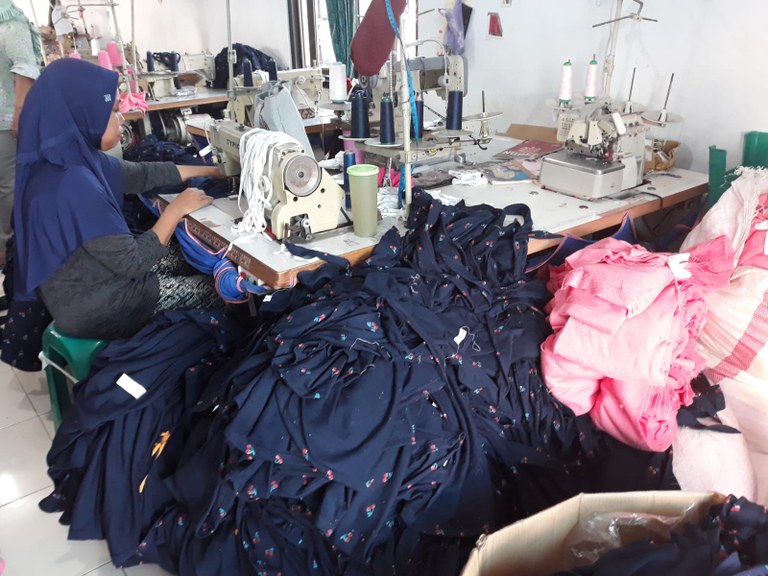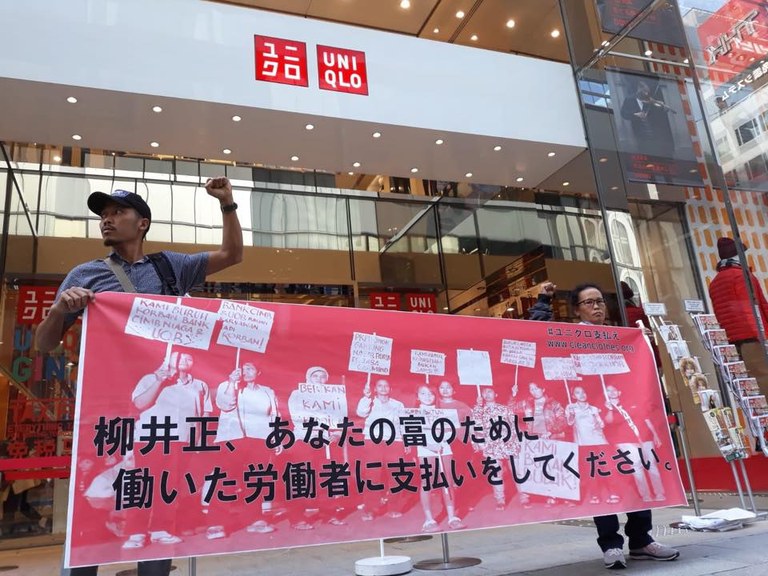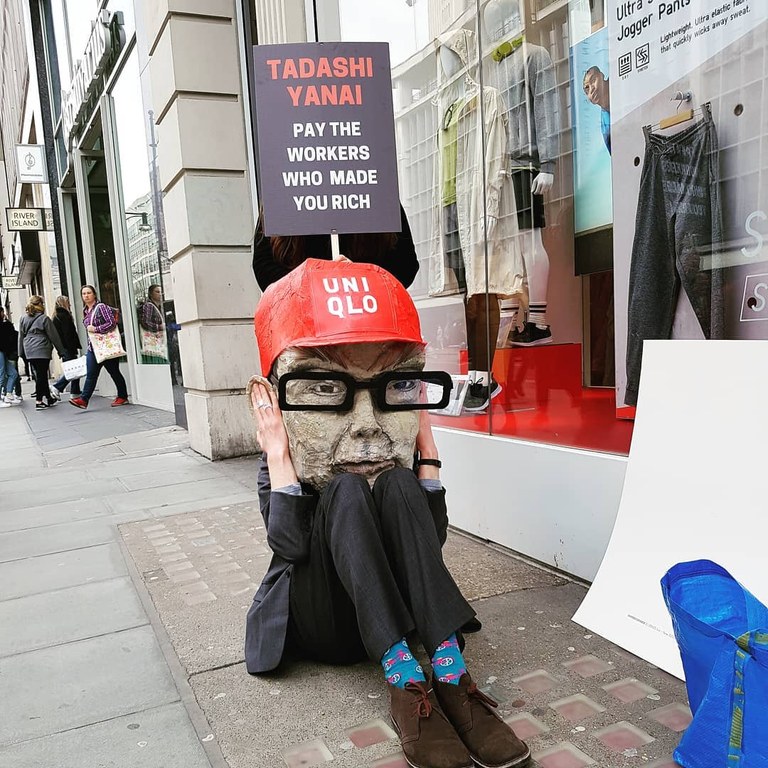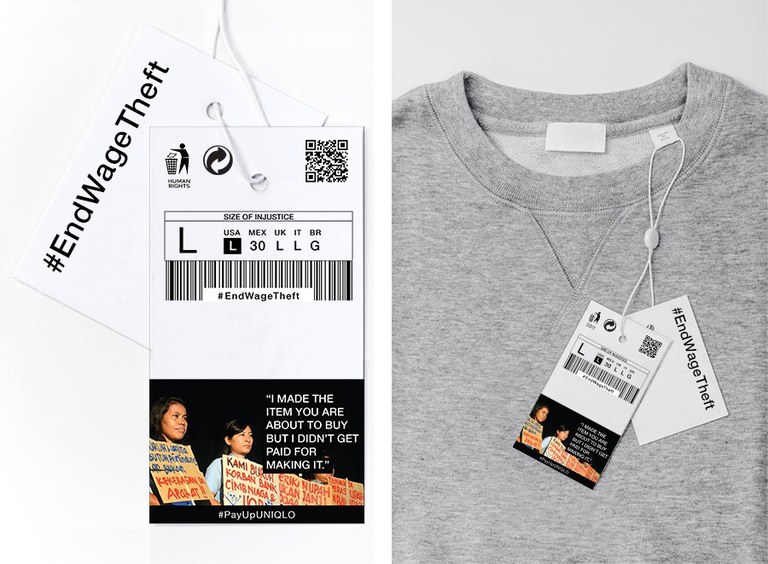Jaba Garmindo
After Japanese brand Uniqlo withdrew orders from the Jaba Garmindo factory in Indonesian, the factory went bankrupt. 2,000 workers lost their jobs overnight. Since then they have been waiting since for $5.5 million (USD) legally owed to them after their factory closed without notice.
Worker voice:
"Severance is money owed to us, we worked for it, we earned it, but no one will pay us. Without it, I worry I won’t be able to pay for my children’s education. Getting the severance pay we’re owed would change everything, it would give us back our lives and give my children their futures.”
Murni, pictured center, former garment worker from the Jaba Garmindo factory, Indonesia, producing for Uniqlo now collects plastic to make ends meet.

What’s the problem?
Our network received an urgent request for support from the local level Indonesian union FMPSI, when the Jaba Garmindo factory, in Tangerang, Jakarta Indonesia, went bankrupt in 2015. Just months earlier, the Japanese brand Uniqlo had pulled all its orders. Since garment factories are not paid enough to cover the true costs of production, sudden order withrawals can be financially devistating. The workers were left without the severance payments they were owed.
The #PayUpUniqlo campaign calls on Uniqlo to pay the women who made their clothes the money they are legally owed. The strength of the coalition of organisation and the lasting energy of the group of workers pushed Uniqlo to the negotiation table in 2018. With Uniqlo trying to take over the European and US markets, we remain committed to the workers.

What happened?
In April 2015, two Indonesian clothing factories closed down over night without paying legally required severance payments and several months of wages to its mostly women workforce. The factory closures followed the sudden bankruptcy of the company after its major buyers, most notably UNIQLO, withdrew their business from the factory. The thousands of workers employed by Jaba Garmindo were given no warning that their factory was in trouble and many found themselves suddenly unemployed after decades of working for the company.
Since the factory closures, 2000 Jaba Garmindo workers have been demanding UNIQLO accept its share of the blame in what happened to their factory. Legal processes have now been exhausted and there is nowhere else to go for their payment. Many workers are older and have little chance of finding new employment; despite their many years of work the low wages they received during that time mean they have little savings to fall back on.


How can this be solved?
Under Indonesian law, the workers are owed a total amount of 5.5 million USD. Tadashi Yanai, the owner of Fast retailing, the parent company of Uniqlo, is one of the richest people in Japan. We are demanding Uniqlo make sure the workers receive the full severance payment they are entitled to, to be able to pay off their debt and finally start their lives again. Whether this is done by getting all former buyers to contribute, or by a contribution from Uniqlo, is up to Uniqlo.
Many of UNIQLO’s closest competitors have agreed to contribute to the payment of severance claims in cases where a supplier went bankrupt. Nike, adidas, Disney, Fruit of the Loom, Hanesbrands, H&M, Walmart, and Jack Wolfskin have all taken active steps to ensure that workers received wages and severance payments owed when supplier factories went bankrupt. These buyers either directly provided the funds owed to workers themselves, or pressed their supply chain partners (factory owners, buying agents, etc.) to do so, so that the workers received the sums that they were due under law.
Worker voices:
"it’s plainly unjust that workers who made Uniqlo clothes suffer needlessly, while the Uniqlo brand continues to grow and thrive, generating billions in profits. The money we are owed, we earned over years of working hard to make Uniqlo clothes, and to refuse to pay us is tantamount to wage theft,"
- Teddy Senadi Putra, of Labour Union PUK SPAI FSPMI formerly at PT Jaba Garmindo.

“I know Uniqlo. It is an expensive brand. The products must be of good quality. But we, who sewed the clothes, were paid very little. They didn’t know how long we had to work to sew their products. All they knew was setting targets to meet the order. They didn’t know how management pressured us, forced us, yelled, shouted, cursed us. All they knew was that we finished the order right on time and the export went well,”
- Dila Vitra Dian Ningsih, the 38-year-old mother of two young children.
Latest news on this campaign
-
April 19, 2023
s.Oliver gives 100K Euros to Jaba Garmindo workers owed $5.5 million, but where is Uniqlo?
Today marks the 8th anniversary of the Jaba Garmindo factory bankruptcy in Indonesia and the former workers (who produced for Uniqlo and s.Oliver, among others) are still fighting for $5.4 million legally owed to them in severance pay.
-
April 19, 2022
Uniqlo and s.Oliver workers still owed $5.5 million in severance pay: workers release open letter on 7th anniversary of factory closure
Workers call on Uniqlo and s.Oliver to pay up on 7th anniversary of severance theft case
-
April 19, 2022
Open letter from Jaba Garmindo workers on 7th anniversary of factory bankruptcy
Workers release an open letter to the Chairman of Uniqlo and the CEO of s.Oliver, calling on the brands to finally pay up the $5.5 million owed on the 7th anniversary of the Jaba Garmindo factory bankruptcy.
-
July 20, 2021
Fair Labor Association recommends Uniqlo and s.Oliver provide financial relief to former Jaba Garmindo workers
We call for the immediate implementation of Fair Labor Association's (FLA) recommendation with the launch of a new documentary, How to Steal Your Workers' Future, an intimate and powerful portrayal of the long-term devastation that severance theft causes for garment workers and their families.
1 - 4 of 17 Results





